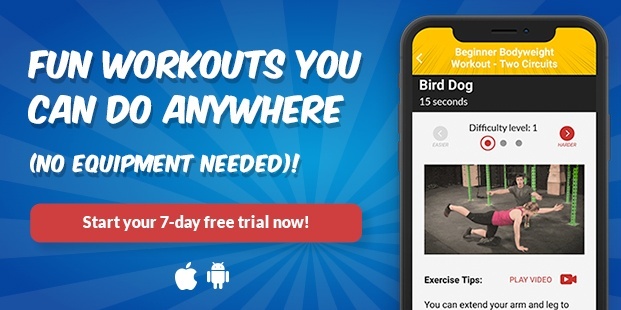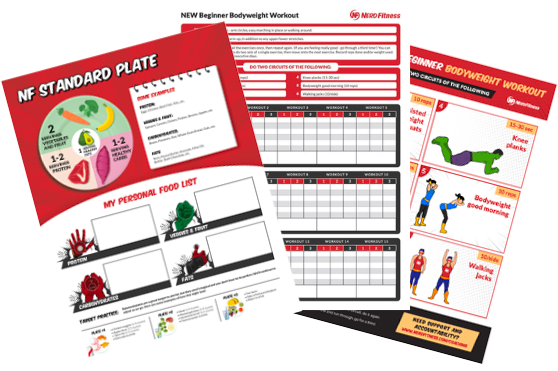
So you want to learn about functional fitness?
Great!
We create strength, balance, and flexibility workouts as part of our 1-on-1 Online Coaching Program, so you’ve come to the right place to learn about functional fitness.
Plus, we add sweet LEGO photos for good measure.
Here’s what we’ll cover to answer the question: “What is Functional Fitness?”
- What is functional fitness and why is it important?
- What are the best functional fitness exercises?
- What is a functional fitness training workout?
- Is CrossFit functional fitness?
- How to build functional fitness (Next steps)
What Is Functional Fitness and Why Is It Important?

Functional fitness means training your body for everyday activities, and to make daily motion easier and safer.
When we practice functional fitness, it’s for activities like:
- Carrying groceries
- Picking up small children
- Walking in nature
- Being mobile on the floor
- Fighting off sharks

Functional fitness seeks to build strength, flexibility, and balance for navigating the physical world and the objects in it.
We do this by replicating and practicing movements necessary in the real world: squatting, pulling, pushing, bending, climbing, walking, and running.
Personally, I like to think of it as becoming “antifragile,” or being able to physically handle the chaos of life.
So for functional fitness, we prioritize natural movements (squats, pull-ups) over exercises that are done on a machine (leg presses, lat pulldown).
Here’s the rationale: in your everyday life, you probably won’t find yourself in a situation where you have to push weights along a guided track…while seated:
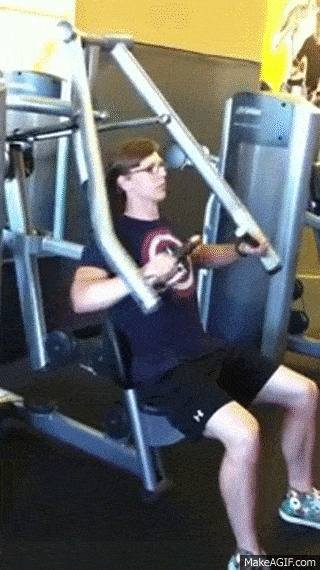
But you’ll probably find yourself in a situation where you have to lift an object from the floor, then raise it above your head, like loading your luggage into the overhead bin on a plane.
So it makes sense to practice:
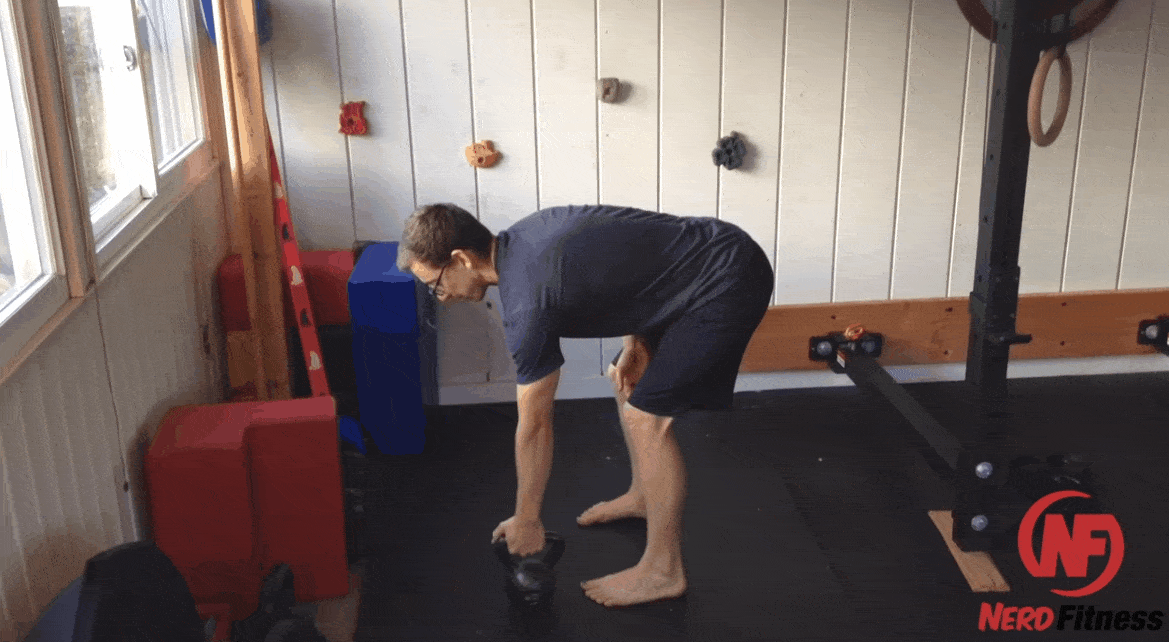
And this too:
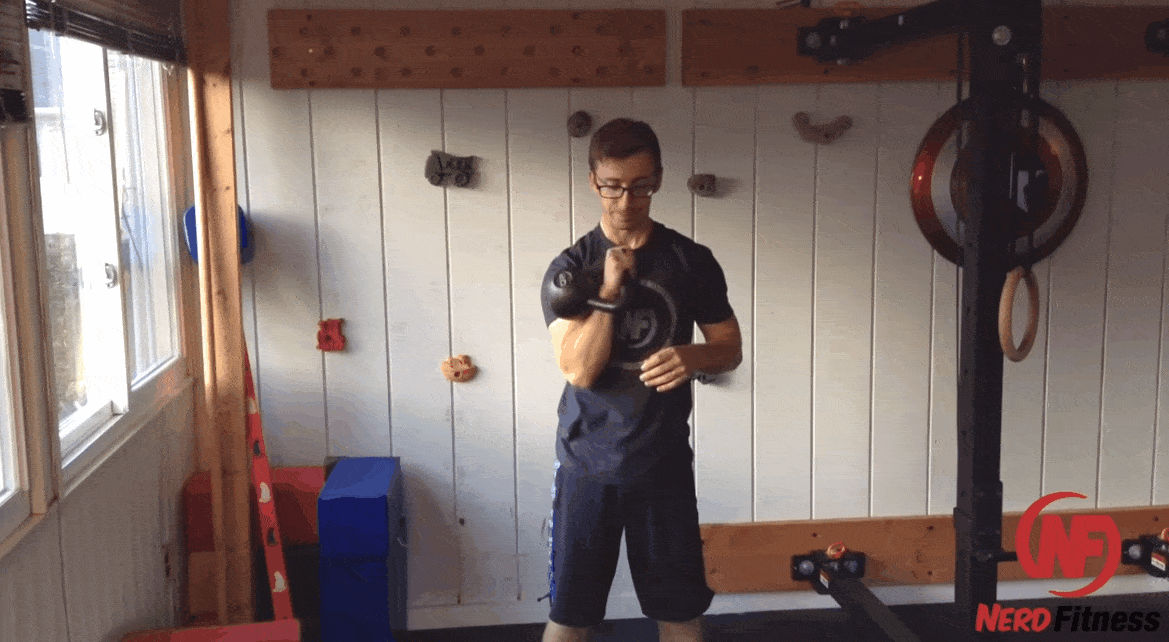
Here, the kettlebell is substituting for an object you may have to pick up and lift during your everyday life: a book, a pet rabbit, a cursed golden idol, etc.
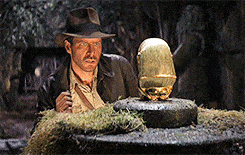
It’s why we encourage free weights instead of machines, because free weights force you to balance and control objects just like you have to in day-to-day life.
Another thing to consider for functional fitness: “compound exercises.”
Compound exercises require more than one muscle group working together for the exercise (squats, pull-ups), so they replicate the way your body actually moves. This would be different from isolation exercises like biceps curls, which more or less train JUST your biceps muscles to move one particular way.
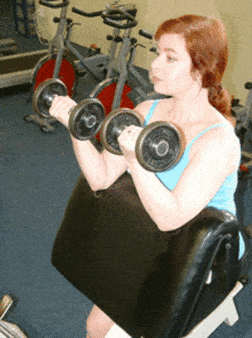
Since functional fitness seeks to improve your body’s ability to work as one unit, compound exercises are encouraged!
As they say, variety is the spice of life.
Let’s give you one last example of functional fitness.
Compare running on an elliptical vs going on a short hike:
- Both will get your heart rate up.
- But a hike will challenge your stability and balance as you move over uneven terrain. The elliptical, on the other hand, provides a repetitive motion over and over.
There is a time and a place for both, but it’s important to introduce variety and instability if your goal is to develop all-around functional fitness.
What’s that? You want exact exercises to try?
The 11 Best Functional Fitness Exercises

A functional fitness workout prioritizes natural movements that help us conquer the obstacles and tasks faced in our everyday life.
Here Are the Best Functional Fitness Exercises:
#1) Squats
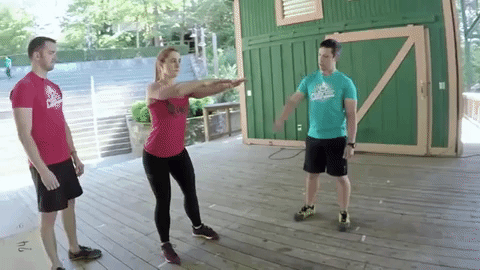
Squats are one of the most fundamental functional movements in our lives.
Getting off the ground, moving in and out of chairs, and shoveling snow will all be easier after a regular squatting practice.
Simple bodyweight squats are a great way to get started, but if this is too tough at first, start with assisted bodyweight squats:
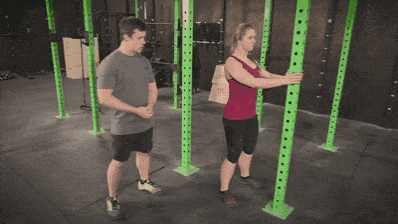
Once you get comfortable with a regular bodyweight squat, you can start incorporating weights, like with a goblet squat:
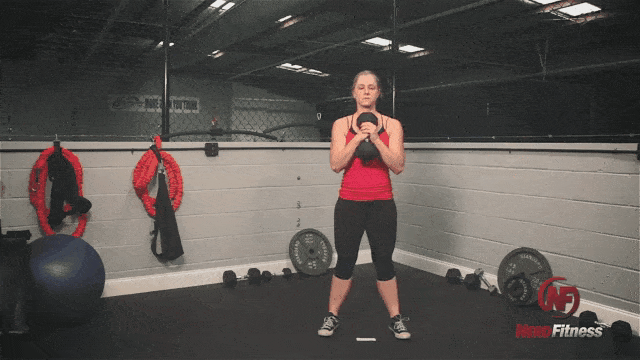
If you build up to a 30-pound dumbbell, this move can replicate picking up a small child off the ground. Practical and functional if you’re a new parent.
2) Deadlifts
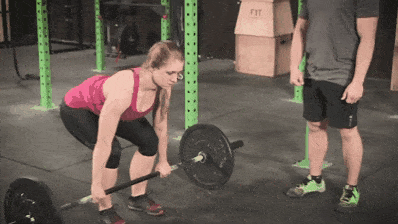
Speaking of picking up stuff off the ground, let’s talk about the deadlift as a part of functional fitness.
Moving furniture, grabbing bags of dog food, and taking a sleeping child to bed are all forms of the deadlift. When you start to incorporate the deadlift into your life, you make all these movements easier (and safer).
If you’ve never deadlifted before, it can be a little intimidating. A good place to start might be the Romanian Deadlift with very light dumbbells:
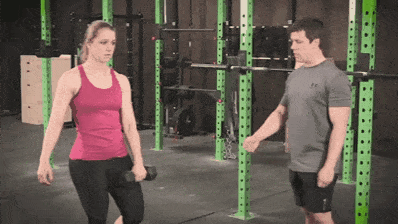
If you’re looking for other deadlift variations, or you want to make sure you have proper form, read our full guide with step-by-step instructions on how to deadlift safely.
#3) Overhead Press

The overhead press is another exercise that will provide benefits in daily life:
- Placing a cast iron skillet into a top kitchen cabinet
- Hoisting luggage into the top bin when flying
- Showing off the piece of the Triforce you just scored

Performing the overhead press will not only increase your upper-body strength, but it will also strengthen your core, since you balance and stabilize yourself while standing and lifting. Compare this to the bench press, where the bench itself offers support during the movement.
Again, some lightweight dumbbells are a great starting point if you’re just getting started:
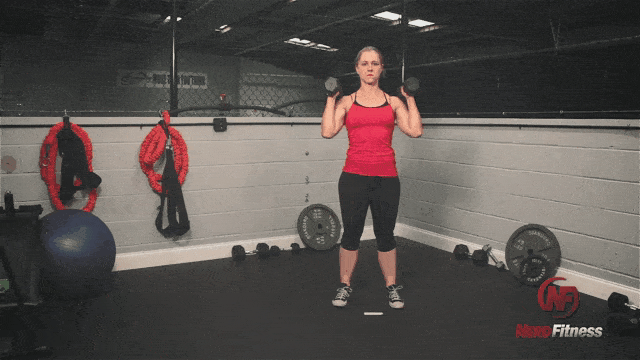
Make sure you read our full guide on how to perform the overhead press for more variations and tips for progression.
#4) Farmer’s Walk

The farmer’s walk is really simple: pick up a couple of weights and walk.
To up the difficulty, pick up more weight. Or walk further.
Very basic, yet very functional, because most of us carry objects from one place to another all the time.
When performing the farmer’s walk:
- Pick the weight up with a good form
- Keep a tight posture with your shoulders back
- Take small, manageable steps
That’s it.
The farmer’s walk will challenge your arms, back, shoulders, core, and grip.
Being able to lift and carry heavy objects is about as functional as you can get.
#5) Bear Crawl
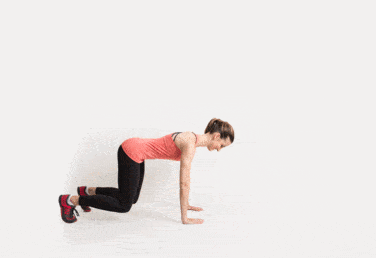
When we’re young, it’s a given that we’ll be mobile on the floor.
As adults, eh, not so much. The only interaction with the floor comes from us standing on it. We won’t even sit on it without a chair helping us.
Not very functional.
Enter the bear crawl…
To perform the bear crawl:
- Begin in a tabletop position.
- Bring your knees up, so they hover.
- Using opposing arms and legs (ex: right arm, left leg), take a small step forward with each limb. You want to use small steps so your torso is stable, instead of rocking side to side.
- Repeat on the opposite side.
It’ll look like this:
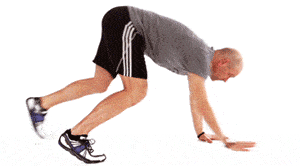
#6) Walking Lunge
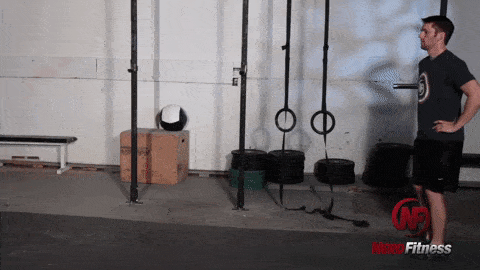
The walking lunge is going to provide lower body strength, as well as balance, for when you come in and out of the movement.
To perform a walking lunge:
- Stand with a shoulder-width stance.
- Step out with your right leg.
- Lower your hips until your back leg’s knee almost touches the ground.
- If you stepped out far enough, your front knee won’t extend past your toes.
- Explode forward and up by pushing off with your back leg and up with your front leg.
- Bring both feet together, and then step forward with your other foot and repeat.
#7) Pull-Ups
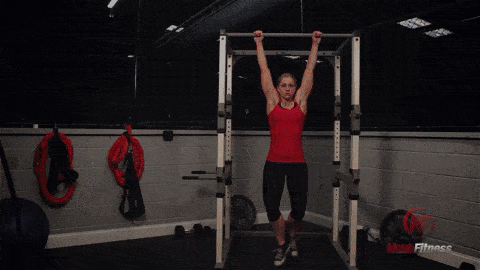
When discussing the best functional fitness exercises, we can’t neglect your “pull” muscles.
Being able to lift yourself up is very functional, and may save your life if you’re being chased by velociraptors.

If you can’t quite get your first pull-up yet, an inverted bodyweight row will help you build strength until you can.

#8) Kettlebell Swing
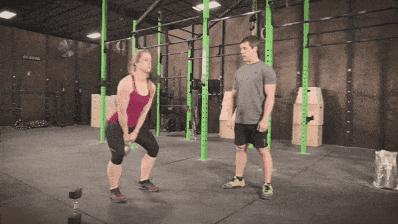
The kettlebell swing is an explosive full-body movement that focuses on building strength with your hip hinge.
How to perform the kettlebell swing:
- Get down into a bent-over, flat-back position and grab the kettlebell with both hands from the handle.
- Swing the kettlebell behind you, then get ready to jump up.
- Jump up (without leaving the ground) and swing the kettlebell up. You should be standing tall at the peak of the movement.
- Reverse the movement and bring the kettlebell back down and behind you.
- Repeat.
If you want more tips for training with a kettlebell (a great tool for functional fitness), then check out “The 20 Minute Beginner Kettlebell Workout.”
#9) Push-Ups
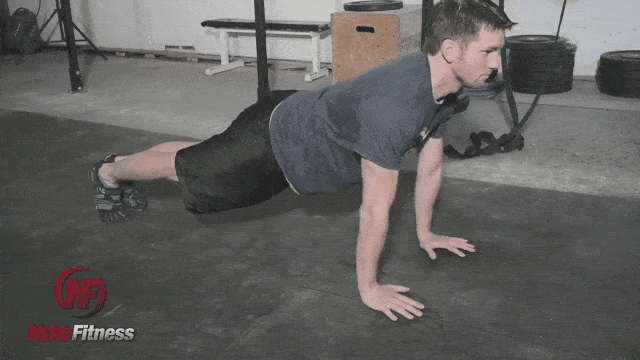
Push-ups, the ole fitness staple. But being able to hold yourself firm in a straight line (don’t sink), while pushing yourself up will create a lot of core strength. And a great functional exercise.
Plus, you can add some variation to level them up, creating a more dynamic exercise.
For example, you can do dive bomber push-ups:
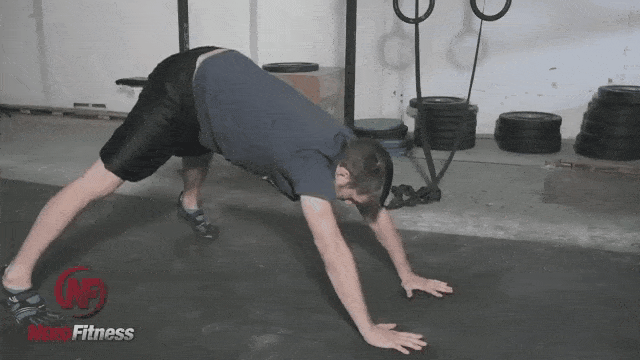
#10) Step Up
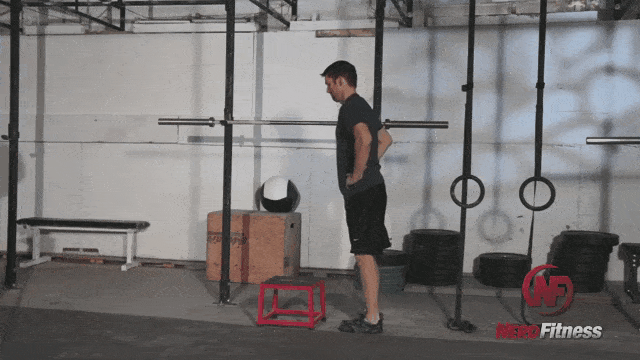
It doesn’t get much more functional than going up steps. Life doesn’t always provide us with elevators.
If this seems too easy, start mixing weights into the practice:
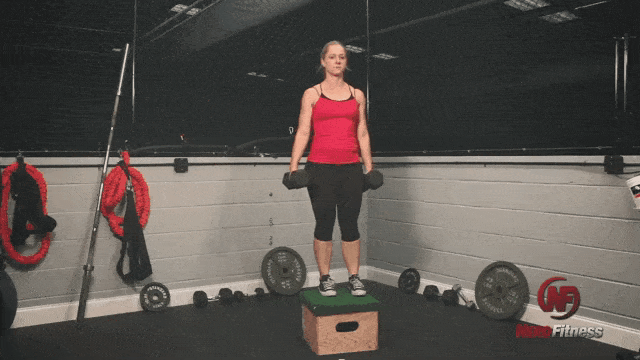
#11) Box Jump
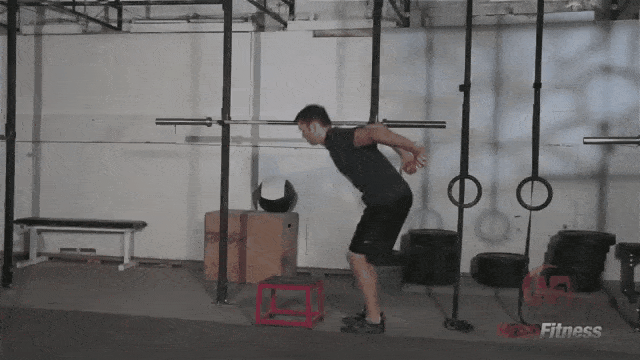
As Mario would know, sometimes you have to jump on stuff.
Practicing jumps will improve your power, balance, and agility, all critical for functional fitness.
Coach Matt walks explains how to get your first box jump in this video:
BONUS: #12) Handstands
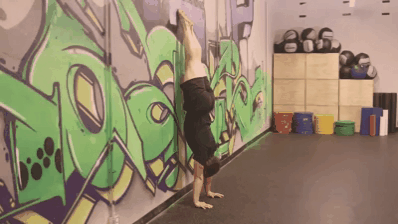
On the one hand, handstands are really tough. On the other hand, the amount of strength and balance required to perform handstands are central to functional fitness.
And…ah…you need both hands to do it…unless you’re Luke Skywalker:

We have a full guide that will walk you through getting your first handstand, from simple wrist stretches:
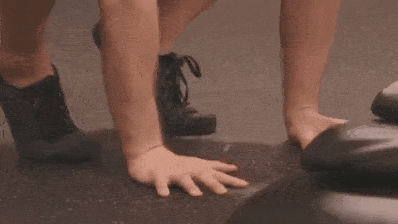
All the way to handstand push-ups:

Are you doing these moves correctly? A good way to check would be to record a video of yourself and match it against the gifs and videos here. If they look close, you’re doing great!
The other option would be to have a trained professional review your form, which we can do in our 1-on-1 Online Coaching Program!
Our spiffy mobile app lets you send a video of your training directly to your coach, who will provide feedback so you can perfect your technique.
They’ll also build a workout program that’s custom to your situation, which can improve your functional strength!
What Is a Functional Fitness Training Workout?

Now that we’ve gone over specific functional fitness exercises, let’s pull them together!
Let’s pull a video to do so!
How to Build Your Own Workout :
As Coach Staci mentions in the vid, for a beginner just getting started, we’d recommend doing a full-body routine, two to three times a week.
A full-body workout will need to include:
- Quads (front of your legs).
- Butt and hamstrings (back of your legs).
- Chest, shoulders, and triceps: (“push” muscles).
- Back, biceps, and grip ( “pull” muscles).
- Core (abdominals and lower back).
Since we prioritized compound exercises in today’s post (because they are more aligned with functional fitness), our muscle groups will overlap when we build our routine.
That’s a good thing.
Using the exercises covered earlier, our Functional Fitness Workout could be:
- Quads: Bodyweight Squats
- Butt and hamstring: Deadlifts
- Chest, shoulders, triceps: Push-ups
- Back, biceps, and grip: Pull-ups
- Core: Bear Crawl
That’s it! If you start doing this once a week you’ll be well on your way to building functional fitness.
If you want to do this twice a week, maybe switch out some exercises:
- Instead of push-ups, try the overhead press
- Instead of squats, try lunges
- Instead of pull-ups, try bodyweight rows
One important point: no matter what routine you pick, always warm up first!
It can be simple arm circles:
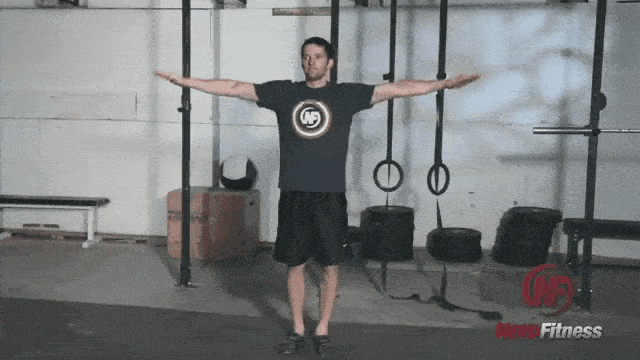
Or some jumping jacks:
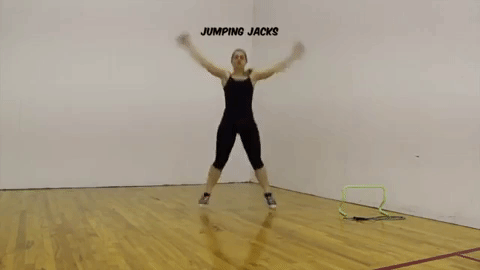
Warming up is important because we want your muscles engaged and loose before we jump right into our training. So warm up for about 5 minutes before jumping into your workout.
As long as you include your warm-up, you can now start your training.
If you want more help building a functional fitness practice, I have a couple of resources for you:
- How to Build Your Own Workout Routine: our guide will walk you through building your own training practice. We’ll teach you what exercises you should do, how many sets and reps you should perform, and how often you should work out. It’ll help you start performing functional fitness exercises today.
- Our 1-on-1 Online Coaching Program: if you want a more customized approach for your exact situation (kids, an old injury, you turn into a werewolf once a month), then check out NF Coaching. We’ll build you an exact plan of attack on how to become a functional fitness master.
Is CrossFit Functional Fitness?
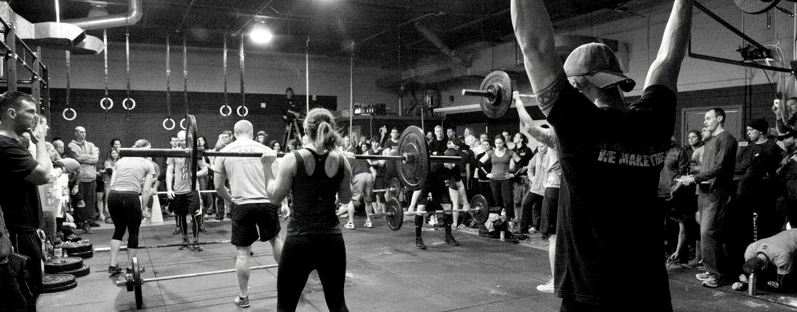
CrossFit claims to support “functional movements” by using “safe, effective and efficient movements similar to those you use every day in life.”
So yeah, that does sound like what we’ve been talking about this whole time.
The difference with CrossFit is the intensity. It’s something we highlight in our Beginner’s Guide to CrossFit.
CrossFit does promote functional fitness. It’s why you’ll see people carrying sandbags, flipping tires, and wielding sledgehammers at CrossFit gyms:
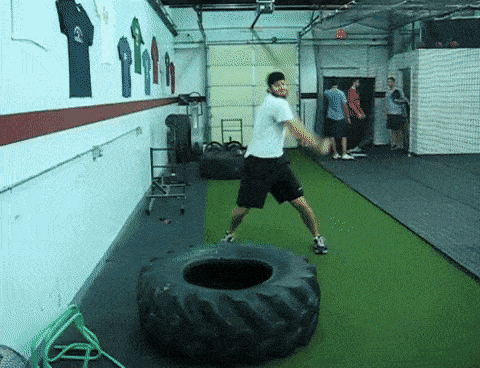
But the intensity is another noteworthy aspect of CrossFit. Workouts are done in a group setting, with people cheering you on.
While this can be great for motivation, it can be less great when trying to move at your own pace and train with proper form.
Now, this is a generalization, and all CrossFit gyms will have their own characteristics and culture.
If you’re curious, it doesn’t hurt to walk through the door of your local CrossFit gym – just make sure you read our Crossfit Beginner Guide first. I’m sure they’d love to see you and show you around.
How to Build Functional Fitness (Next Steps)

We’ve covered a lot of different ways to increase and build functional fitness.
But our article barely scratched the surface:
- Gymnastic rings would be a great way to promote functional fitness.
- Working your way towards your first handstand is fun strength practice.
- A yoga routine could also be considered “functional.”
- A hike would be a great way to prepare for traveling through natural landscapes.
Also, let’s not get close-minded here. Being strong will help you navigate the world in front of you, so in that sense, any form of strength training could be considered “functional fitness.”
So would parkour, which has you traveling through urban landscapes:
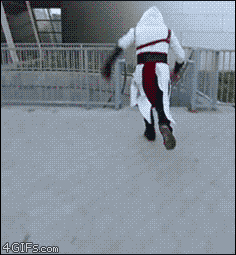
Just find something you like and get started!
The more you do, and the more variation you include (barbell training, yoga, and hiking), the more functional fit you’ll be.
This is how you become “antifragile.”
Now, all that’s left to do is start:

Want a little help getting going? The perfect next step on how to begin your functional fitness journey?
No problemo!
Here are 3 options to continue with Nerd Fitness:
Option #1) If you want step-by-step guidance on how to get strong, lose weight, and level up your life, check out our killer 1-on-1 coaching program:
Option #2) If you want a daily prompt for functional fitness workouts, check out NF Journey. Our fun habit-building app helps you exercise more frequently, eat healthier, and level up your life (literally).
Try your free trial right here:
Option #3) Join the Rebellion! We need good people like you in our community, the Nerd Fitness Rebellion.
Sign-up below and receive our free guide Strength Training 101: Everything You Need to Know. It includes step-by-step instructions for the Best Functional Fitness Exercises covered in today’s guide.
Alright, enough from me. Your turn:
Do you practice functional fitness?
Do you have any specific exercises you cover?
Any tips or tricks for someone just getting started?
Let me know in the comments!
-Steve
PS: Strength training would be a great way to promote functional fitness. If you’re not sure where to start with your strength training journey, start here.
###
GIF Source: Bear Crawl, Batman vs Shark, Triforce, Indiana Jones, CrossFit, Chest Press, Parkour
Photo Source: “I’m Batman,” Wandering, Strongman, Scenes from an empty lot in Brooklyn, vol 1., Antonio Guillem © 123RF.com

